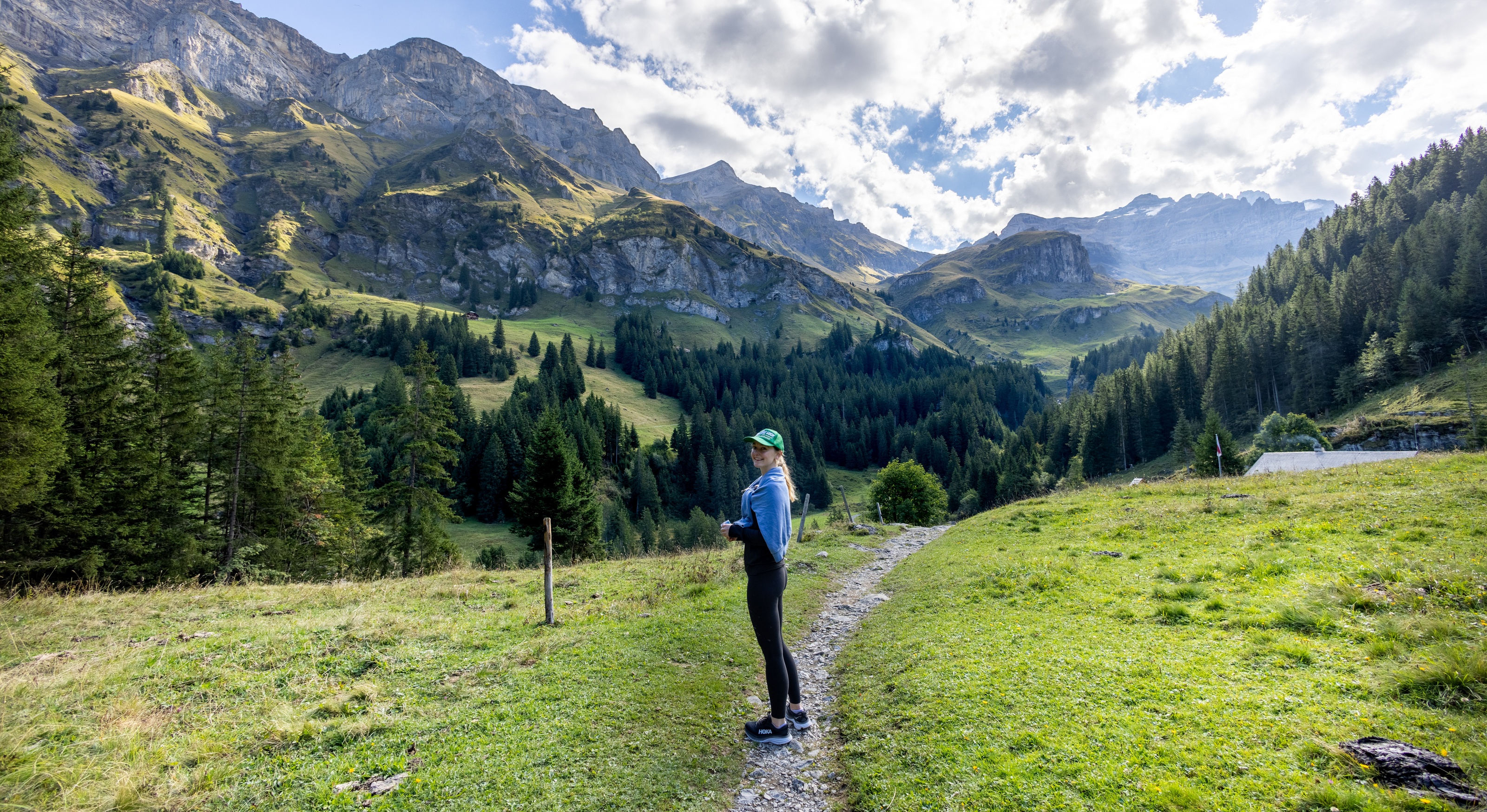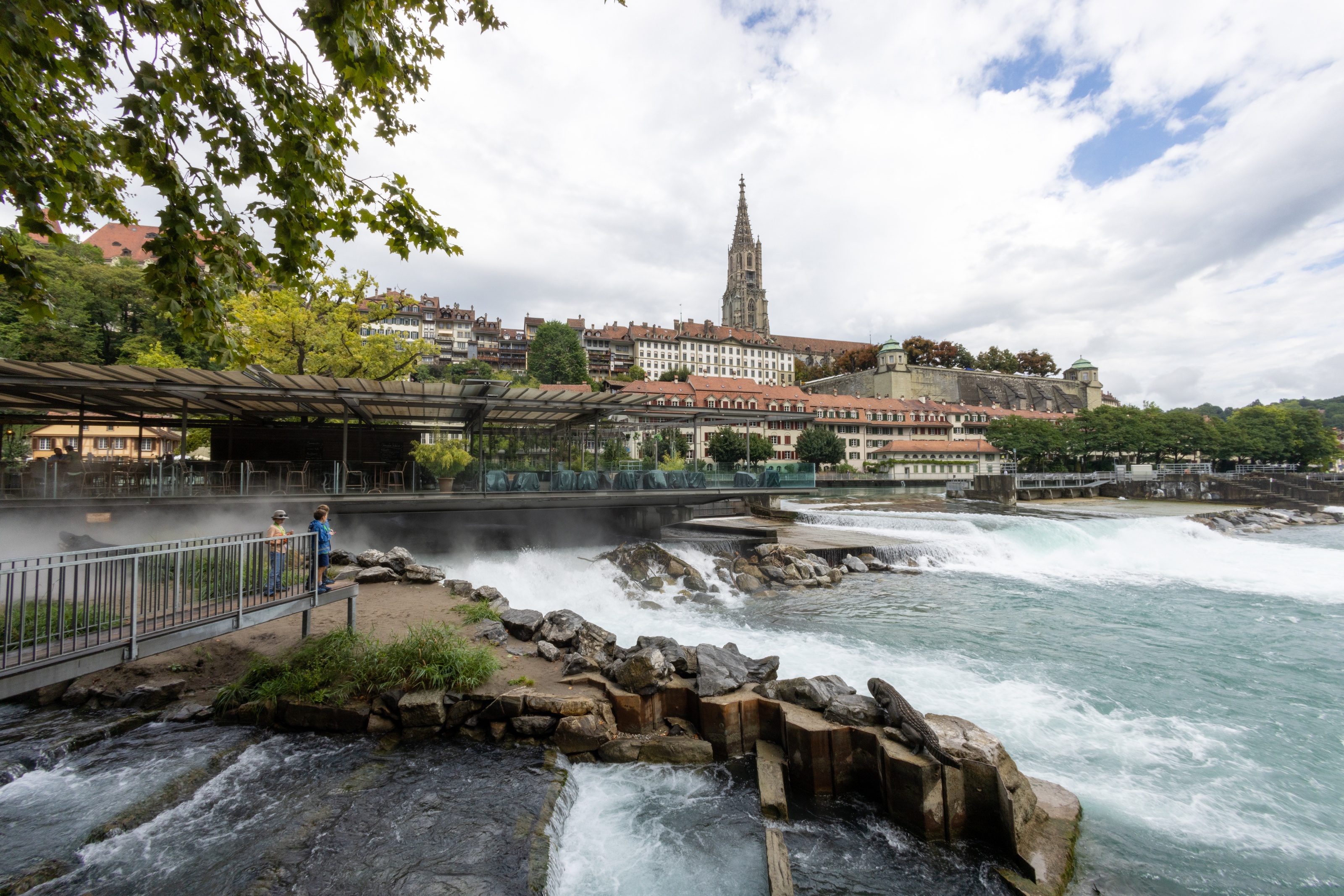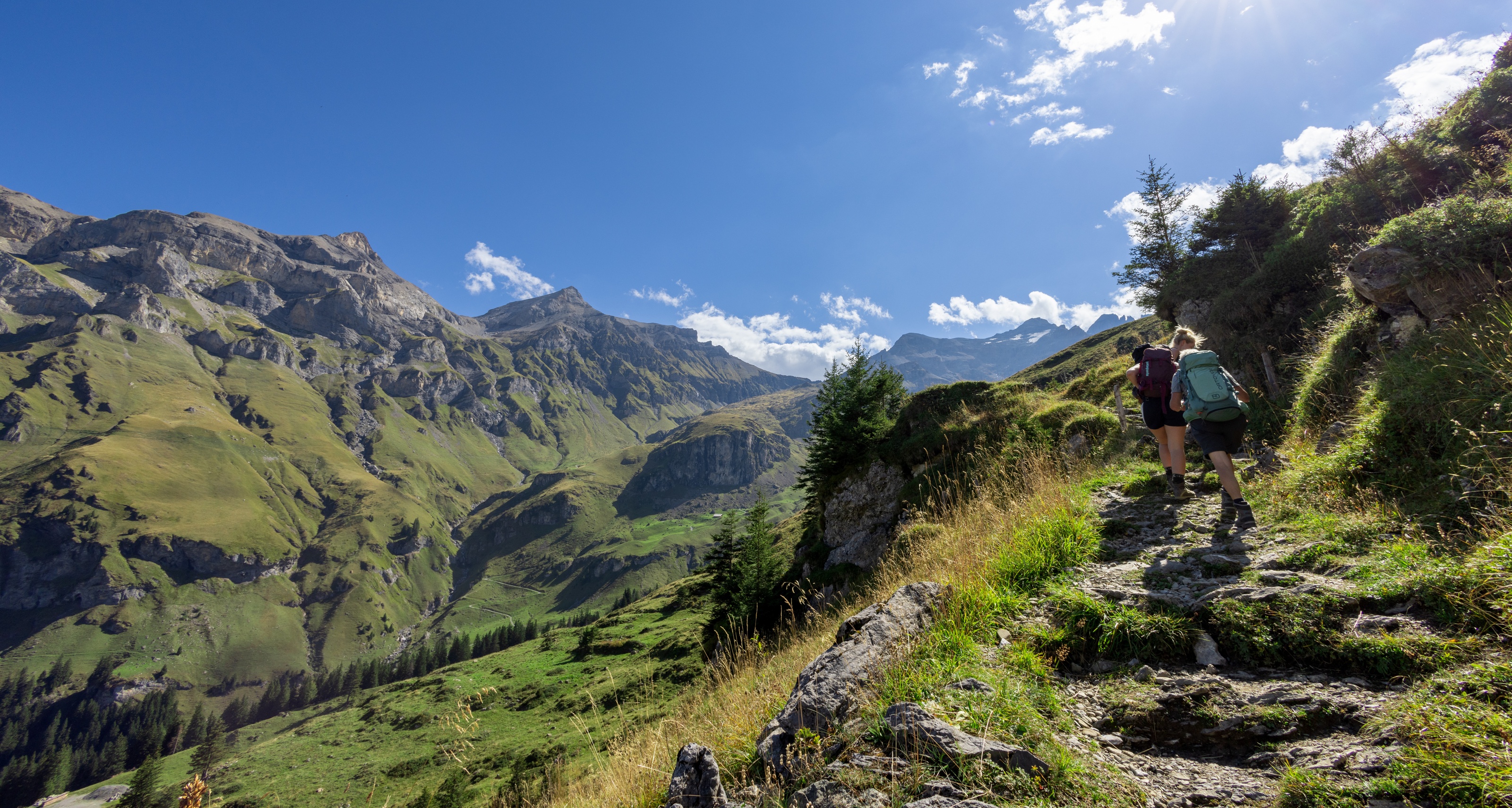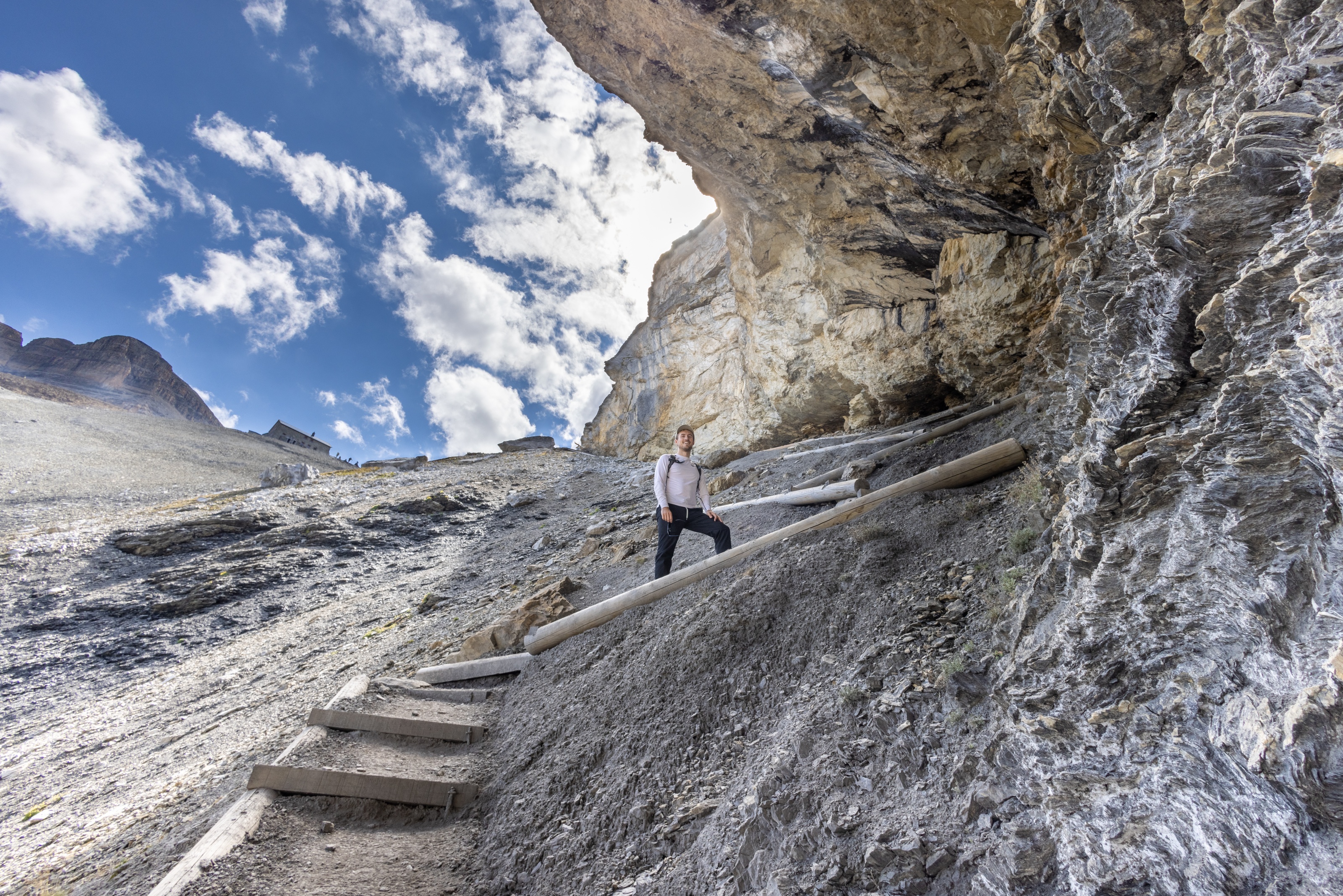Switzerland
# September 10, 2022

Switzerland was the first place where we traveled through the whole country during our remote work stay. Part of that is because of its size. Switzerland is an incredibly small country even by European standards. It measures 15,940mi² compared to Portugal's 35,645mi², or Italy's 116,306 mi². That's not to mention France at 210,016 mi². The other related part is its train network. We had an easier time getting around Switzerland with three transit connections than getting from Paris to Amsterdam on a single train.
Also interesting about Switzerland is how it's a nexus of the rest of Europe. It's organized into cantons, which are effectively separate governing states. One speaks Swiss-German as their first language; the other French; the other Italian. There are five national languages once you include Romansh and English. I was told before we arrived that's the key value of English - it's used as a conduit between all the different languages. In reality we found the lingua franca to be Swiss-German; everyone learns it at some point in their education and most people speak it with effortless fluency. Yet even so we didn't have an issue.
Given our optimism about Switzerland's accessibility, we planned an ambitious itinerary: Zurich to Bern to the Alps to Geneva.
Trains
We flew into Zurich but immediately left for a smaller town. We didn't even get out of the airport. You walk downstairs and there's a train station underneath that has connecting trains across the country. We chose Bern.
On the way we shared a seat with an ex-ambassador that was stationed around Europe and South America during his time in government. He told us about how much easier it was to get acclimated to those countries back in the 80s and 90s than to go into the east side of Berlin. He also gave us some recommendations about Lake Constance, which we thought we might also be able to squeeze in to our trip. He had to get off on an earlier stop but said that he would have loved to talk to us all day. With the authenticity in his voice I really believed it.
Trains were a theme of our travels in Europe this summer, especially for the last two stops in Denmark and Switzerland. They were flawlessly executed networks; you could get between almost any town in the country with a short change. They also appear to have some similar root causes:
- Coverage: Both Denmark and Switzerland are similar sizes. There are simply fewer factorial miles of track needed to connect their towns. As such you can optimize for coverage of train routes instead of having to connect New York to Chicago. Switzerland has 3,241 miles of track to the United States's 21,356 of Amtrak.
- Usage: Trains are not just used in a pinch. Everyone we talked to take them anywhere they can - they're typically faster and cheaper than cars while letting you focus on other things. We certainly got a lot of work done while the countryside flew past us. As such, it starts a virtuous cycle where more people will fund them and therefore use them.
- Reliability: We found both networks to be a maximum of two minutes delayed at any time, even for trains going around the country. Most cities have local trains or a well facilitated last minute bus network; even places in the Alps have access. These run less frequently but they still maintained their timetables to a tee.
- History: Start early and build often. The earliest cross-country train in Switzerland was built in 1847. In Denmark: 1854. They've both been continuing to build out the network ever since. Because land has gotten proportionately more expensive in the past century and governments seemingly less willing to claim eminent domain1, they've been able to upgrade routes with better tracks and better trains without having to establish the infrastructure from scratch.
In Switzerland we got more experience with long haul trains. Here there appears to be an interesting country wide optimization system at play. Our train from the Alps to Geneva stopped for a few additional minutes as the conductor came on to tell us that we were waiting for another connecting train. The other train was late in to the station and we were the primary connection to get those riders back to Geneva. This poses a challenge - you can't let individual delays cascade in the system, but you still want to wait for others if possible. Depending on the delay and alternative choice sets, trains must decide to continue to or delay. It almost sounds like a policy gradient. I need to talk to one of their train conductors.
Bern

Bern is the capital city of Switzerland. The main downtown of Bern is at the top of a hill that overlooks the Aare River. Everyone kept talking about the Aare - but when pronounced it really sounds more like a pirate's 'aar. It took me a good day before I realized people were inviting me into the river, not into a uniquely themed birthday party.
Floating in the Aare is a big past-time of Bern. You can take the train a half an hour outside of the city center, jump into the lake, and float your way downtown. In the summer there are hundreds of people meandering in the lake. We were there a bit late in the season - and on a pretty gray day - so we floated by ourselves. The lake was shockingly cold when you first jumped in, but you can acclimate pretty quickly and enjoy the scenery as it runs past you. A mist started drizzling by the time we got into the downtown so we got to enjoy the sound of raindrops colliding with the water.
On top of Bern's hill, perched against the sky, is the capital building. It's a beautiful building with limestone bricks and grand engravings. It also had no visible security. At night you'd see college kids gathered around the steps drinking beer. Members of their leadership council will sometimes go across the street for a drink after work. The whole place felt like the seat of a local government, not the government of an entire country. But it felt right for that to be the case. It was a friendly capital.
Adrianos - Coffee shop that feels like an old diner inside. Stellar lattes all served on a silver tray. It rained right after we got there so we ended up staying for an hour or so. Very warm and cozy especially on a fall or winter's day.
Tournhalle - Great venue for music and a drink near the city center. There are tables scattered in an outdoor courtyard and on the night that we went, hundreds of people standing and laughing for the course of the evening. Bern's known as a sleepy city but this place couldn't have felt more alive.
Farmers Market: On some weekdays and weekends they have a big culinary market. Most stands specialize in meat, cheese, and chocolate. I found all the above to be very good regardless of where you went, but it was clear that most of these vendors only made extremely limited quantities - and some of it effectively produced at home. The obsession to detail showed.
Also worth noting is Raclette. It's a dish where you melt the top of cheese over heat, then pour it on potatoes or ham. Do it if you get the chance. We passed by a stand at the farmers market selling it - both uncooked and cooked right in front of you. There was a line queuing up for the fresh stuff. We oped to do it at home instead but you can't go wrong either way.
The Alps

Next up on our journey was in the great outdoors. We took an easy train from Bern that dropped us right at the doorstep of the mountains. Since the trains only get you to the base, a Post Auto bus gets you the rest of the way. Locals affectionately call it the Yellow Bus, since it indeed is incredibly yellow. Its horn also resounds around the valley since it has to honk every time there's a one way street while it's navigating.
All hotels in neighboring towns were fully booked, except one. There were some photos online but it was a new construction so it had only a handful of reviews. We decided to take the chance anyway. We signed up sight unseen for a half pension plan - room and board bundled together. Half pension corresponds to breakfast and dinner; full pension would have included lunch as well. Since we were out walking for most of the day we didn't think we needed the noon meal. You can also pay adhoc for lunch, which we did on a couple of the days.
Our room was lovely - brand new construction with natural wood and a patio overlooking some of the mountains. There wasn't any wifi as far as we could tell, but they did provide some ethernet cables if we wanted to plug in that way. They also provided a note talking about their building philosophy. They only sourced sustainable materials from local growers, cut as moonwood. They kept power outlets to a minimum to encourage less grid draw. The ethernet cables were a choice as well. They wanted to reduce radiation exposure. It was certainly opinionated but we were just happy to get a room.
We showed up to a late lunch on the first day, which was our first time meeting our fellow guests. They were all bare footed and wearing flowing pants. A few people were sitting by their tents that they had pitched on the grass. Some people were still in meditation by a pond. We finally put two and two together - we had stumbled straight into a Yogi retreat. The building philosophy made a lot more sense given the clientele.

The next day we did our ambitious hike. Our goal was the highest chateau on the mountain. Switzerland has a hut-to-hut hiking culture like some other places in the Alps. Many of the major peaks have lodges in them - complete with food, beds, etc. This particular trail was on our map as 1400m of elevation gain up the mountain and to the chateau. The trail took us along a meandering trail to start that climbed higher and higher into into the hills. It took us through alpine forests and a carpet of green so vibrant it was hard to believe.
We stopped for a breath of air and could hear the cow bells chiming in the distance. Up close the bells are a pretty jarring sound, but when given some distance they ring with a happy resonance across the valley floor. The cows themselves couldn't be friendlier. We had to pass a few as we hiked up the trail. They look at you with a teaspoon of curiosity and then go back to their business. Which appears to mostly be eating grass.
Before we knew it we were really climbing. We had to cling with both hands to a rope that was joined to the rocky wall. Some steps of wood were embedded into the hilltop to give you something to grip on the way up. We passed some more intrepid hikers than us - people decked out in full hiking equipment, backpacks, and polls. Considering our aesthetic of joggers and athletic shirts it made for quite a comparison2.
Turn after turn we expected to find the chateau. It remained stubbornly out of reach. Eventually we got to a rocky patch that was straight uphill. Still no sight of human life. Did we somehow stumble onto another trail? Were we going to have to sleep the night in our light overshirts? Did we pack enough cookies for a romantic dinner for two?
We needn't have worried. There were still the rocks signposting our way. We just needed to head a bit further before we were able to see the roof peeking above the cliffs. What a celebration it was. At the top I got a sausage and Rosti, which might have been the best potatoes I've ever had. Granted we were starving after our alpinist adventure but I'm still going to give this place a more than enthusiastic Yelp review.
Bourg-en-Lavaux
We left the Alps and headed to a town outside of Geneva, Bourg-en-Lavaux. Lavaux is a relatively new township. It was merged out of Cully, Epesses, Grandvaux, Riex and Villette in 2011. When you look out from the train that runs right next to the town, you'll see dividing lines criss crossing the landscape. Some homes, some downtowns, many vineyards.
From the people we talked to there, there's a tight collectivist philosophy to the area. Wine producers form coalitions and bottle the best grapes from each vineyard. The age of wine growers is capped at 65 to give the next generation an opportunity to try their hand at production. Parents hand their vineyards over to their kids. There's also immense pride in the region. Taste testers sample wine ever year to mark the best ones. Reviews are aggregated over 20 years to nominate the best producers and throw a festival for celebration. This festival goes for weeks and attracts thousands from the greater area. Citizens who are abroad even make a point to come back for this festival.
A few local fishermen have been catching lake fish for the last decades. Apparently the locals have a saying: the fish swim three times. First in the lake. Second in the butter. Third in the wine. By our experience these fish were particularly wonderful.
Still recovering from the Alps, we mostly kept things local around town. We had a fantastic lunch at Happy Bear - weird name but great food and solid coffee. We dipped into the lake and caught a restored boat around the lake. We spent a lot of time working but the weather was nice enough to do most of it outside.
Our stint in Lavaux was short but memorable. It left me wondering how many more small towns there are to explore. With the quality of the train network, though, I bet you could make pretty easy work of it.
To the States
With Switzerland behind us, we're headed back to the US for the winter ski season. We caught an easy Condor airlines flight out of Frankfurt and are homeward bound. Until next time Europe.
-
This is a trend most acutely observed in the United States. Population density has increased in places where building public services is most desirable, like cities or suburbs. As parcel sizes have shrunk it's logistically harder to claim eminent domain over multiple properties. The increase in property inflation also makes it harder to compensate individuals in accordance with the fifth amendment. Public sentiment has also soured on the notion of state property acquisition. ↢
-
I was immediately impressed by the age of the average hiker. We were probably the youngest people on the trail - most were in their 40s or 50s, with a few even in their late 60s. Most were Swiss, German, or French. All of whom said they fell in love with hiking and will continue to prioritize it for as long as they can. ↢